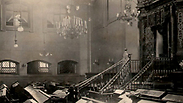
Vilnius synagogue destroyed during the Holocaust
Lithuanian artists grapple with compatriots' dark role in Holocaust
Leading novelist Sigitas Parulskis's 'Darkness and Partners' and film director Audrius Juzenas' 'Ghetto' deal with Lithuanian role in the Holocaust: 'You need to face the truth to find out what you want to tell your children and what you want from your future.'
Lithuanian writer Sigitas Parulskis first confronted the enormity of the Holocaust during a visit to London when he stumbled across a museum plaque showing collaborators from his small town who took part in the mass murder of Jews.
Decades after the end of World War II, in which six million Jews across Europe were annihilated by the Nazis, some Lithuanian artists are confronting the role played by compatriots in the killings.
For Parulskis, Lithuania's leading novelist, playwright and essayist, the discovery in 2010 that his northern town Obeliai saw 1,160 Jewish residents killed by the Nazis and local militias led to soul searching and resulted in the country's first novel to confront the traumatic wartime legacy.
"Darkness and Partners" created a storm at home when it was published in 2012.
The graphic novel, which has yet to be translated into English, centers on Vincentas, a young photographer living in a rural town, who captures the gruesome work of Lithuanian executioners at the behest of a brutal Nazi SS officer nicknamed "the artist". At the same time, Vincentas pursues a clandestine relationship with a Jewish woman.
Parulskis said he was accused by some Lithuanians of seeking to make money, gain publicity, or feed "a Holocaust industry". Others urged him to keep such themes taboo.
"It does not matter if we are Lithuanians or any other nationality - we cannot simply avoid it," Parulskis said on a visit to London. "There is shame within us and if we do not expel this shame, it is not a good thing."
Despite anger from some, Parulskis was awarded Lithuania's person of tolerance award in 2012 and also received positive support from other Lithuanians.
Lithuania was annexed, along with neighboring Baltic states, by the Soviet Union under a 1939 Nazi-Soviet pact, gaining independence in 1991. After World War Two, the legacy of the Holocaust was virtually blacked out.
"During the writing of my book, I went back to my town. The center of town would have been completely empty the day after the Jews were killed. It would have been like something from a horror film," Parulskis said.
"Jews who were erased from the life of that small town ... they have not disappeared from my memory nor, as a consequence, from the map of existence."
The capital Vilnius was known across the Jewish world as the Jerusalem of the region due to its once vibrant cultural and religious life.
Lithuania's Jewish population numbered around 220,000 when the Nazis invaded in 1941 and just over 10,000 survived. German squads were assisted by Lithuanian auxiliaries in killing Jews.
Lithuanian film director Audrius Juzenas also explored similar themes with his 2006 movie "Ghetto", which dramatized a Jewish theater company that performed in the Vilnius ghetto and was adapted from a play by Israeli playwright Joshua Sobol.
Juzenas is working with Parulskis on filming Darkness and Partners. "All of this concerns our history where citizens - who were Jews - were killed. Experiences of that period are a message for the future," Juzenas said separately in London.
"You need to face the truth to find out what you want to tell your children and what you want from your future."










